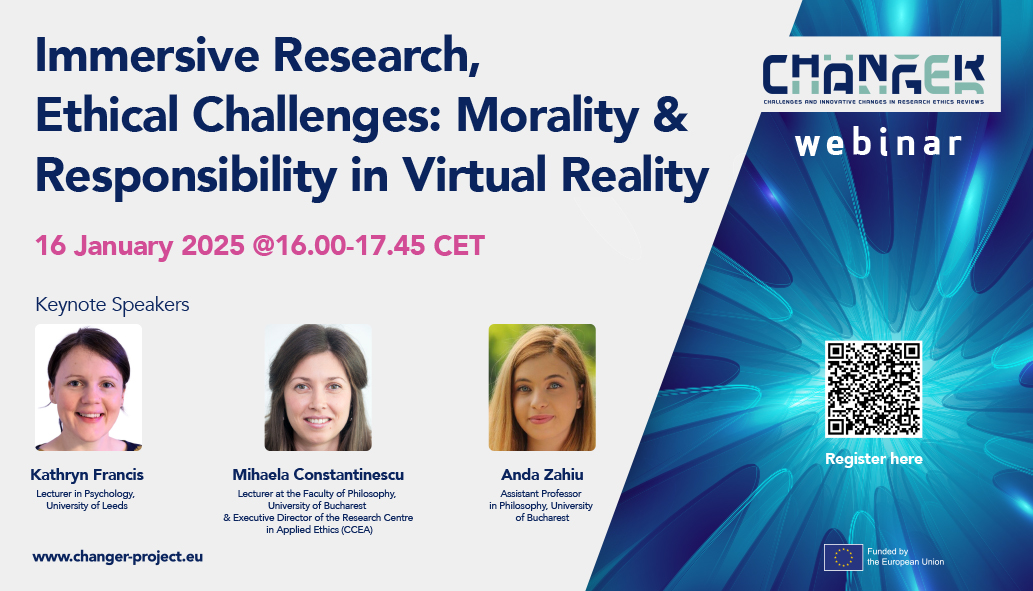[VIDEO] Webinar: Immersive Research, Ethical Challenges: Morality & Responsibility in Virtual Reality | January 2025
On Thursday 16 January 2025, the CHANGER EU project, hosted a webinar titled Immersive Research, Ethical Challenges: Morality and Responsibility in Virtual Reality. This webinar brought together cutting-edge technology and ethical inquiry to explore how virtual environments are transforming research practices and challenging traditional moral frameworks.
By moving from text-based moral vignettes to immersive Virtual Reality (VR) simulations, researchers are gaining new insights into moral decision-making, empathy, and prosocial behavior. The emergence of the Metaverse further complicates these inquiries, as avatar communities blur the lines between individual and collective agency, raising pressing questions about moral responsibility in a world where physical, virtual, and augmented realities increasingly overlap. VR’s role as a morality lab, enhanced by tools such as EEG (Electroencephalography) and eye-tracking, showcases its potential to strengthen human moral capacities while also underscoring ethical concerns related to neuroplasticity and agency. The webinar invited participants to consider the opportunities and challenges of using VR in research and to reflect on how we can navigate these transformative possibilities responsibly for individuals, communities, and society at large.
Watch the video of the webinar:
Agenda of the webinar
| Time | Title | Speaker |
|---|---|---|
| 16.00 – 16.10 | Welcome – about CHANGER & webinar introduction | Constantin Vică & Vassiliki Mollaki |
| 16.10 – 16.35 | Ethical and Methodological Challenges in Virtual Morality Research | Kathryn Francis |
| 16.35 – 17.00 | Moral Responsibility and Avatar Communities in the Metaverse | Mihaela Constantinescu |
| 17.00 – 17.25 | Everything, Everywhere, All at once: VR as a Morality Lab | Anda Zahiu |
| 17.25 – 17.40 | Q & A session | ALL |
| 17.40 – 17.45 | Closing the webinar | Constantin Vică |
Meet the speakers

Kathryn Francis | Talk: Ethical and Methodological Challenges in Virtual Morality Research
Traditionally, moral philosophers and psychologists have measured moral decision-making using text-based vignettes. These controlled thought experiments provide a structured way to assess moral theories but often lack contextual richness. In a series of studies, we incorporated Virtual Reality (VR) and Haptic VR simulations to explore moral decision-making in more contextually salient scenarios. I discuss the contribution of these studies to existing theories of moral decision-making and reflect on the broader role of VR methodologies in empirical research. Critically, I consider several ethical benefits and challenges of using simulation technologies in research and how we might navigate these as Extended Reality (XR) technology continues to advance.
Kathryn Francis is a Lecturer in Psychology at the University of Leeds, where she leads the Moral Minds Lab. The lab investigates moral conflict using innovative methods such as Virtual Reality simulation and across applied contexts including bioethics and medical decision-making but also sustainable behaviours in the context of both pro-environmental decision-making and human-animal relations. She is an active member of the Experimental Psychology Society (EPS) and the European Association of Social Psychology (EASP). For more information, visit her website: https://www.kathrynfrancis.com/

Mihaela Constantinescu | Talk: Moral Responsibility and Avatar Communities in the Metaverse
Emergent avatar communities in the Metaverse challenge traditional frameworks of agency and moral responsibility that rely on ontological and epistemological claims about the physical world. The unprecedented persistent and continuous use of multiple avatars, by both humans and organisations, has the potential to permeate prior boundaries of the physical, the augmented and the virtual world. This talk explores the need to develop new normative frameworks to ascribe moral responsibility, which consider the way interactions between avatars, individuals, and organisations generate intertwined roles and systemic functionalities. These intertwined interactions produce mutual ascriptions of moral responsibility to individual, collective, and artificial members of avatar communities, potentially enhancing or, on the contrary, diminishing human agency and responsibility.
Mihaela Constantinescu is a Lecturer at the Faculty of Philosophy, University of Bucharest, and the Executive Director of the Research Centre in Applied Ethics (CCEA). She serves as the Principal Investigator of the avataResponsibility project – Avatar Agency: Moral Responsibility at the Intersection of Individual, Collective, and Artificial Social Entities in Emergent Avatar Communities. This five-year project is funded by the European Research Council. Her research focuses on virtue ethics, business ethics, Human-Robot Interaction, and AI ethics, particularly examining the normative interplay between moral responsibility and moral agency in relation to individuals, organizations, and AI systems. For more details, visit her project website: https://avataresponsibility.ccea.ro/.

Anda Zahiu | Talk: Everything, Everywhere, All at once: VR as a Morality Lab
Psychology and cognitive sciences were soon to get a digital makeover when Virtual Reality technologies became mass market products. VR provided a much-needed technological fix for issues pertaining to ecological validity in experimental contexts. Paired with EEG, physiological sensors, and eye-tracking technology, VR research promises to overcome the traditional hurdles associated with lab-based assessments. Some of these studies, in particular, aim to explore the gap between moral judgements and moral behaviour, providing much needed empirical insights into long-standing debates in moral philosophy. However, VR can be more than a virtual research lab- it can be used as a morality lab for the augmentation of important moral capacities such as empathy and prosocial behaviour. In this presentation, I will explore some key promises that VR holds as both a medium and object of research, whilst simultaneously looking at the perils of conjoining research and mediums known to piggyback on our own human neuroplasticity.
Anda Zahiu is an Assistant Professor at the Faculty of Philosophy, University of Bucharest, and a member of the Research Centre in Applied Ethics. Her current PhD research focuses on the ethical and philosophical dimensions of tax and transfer redistributive schemes. With a background in moral and political philosophy, her research interests extend to new and emerging technologies, particularly Virtual Reality and digital avatars. For more information, visit the project website: https://avataresponsibility.ccea.ro/.
CHANGER – CHAllenges and innovative chaNGes in research Ethics Reviews is a three-year Coordination and Support Action (CSA) project, funded by the European Union’s Horizon WIDERA programme aiming to promote changes in research ethics reviews by strengthening the capacities of researchers to incorporate ethical judgements in the project design and implementation, and by supporting capacity building of Research Ethics Committees (RECs) to address new challenges posed by new technologies and new research practices.


